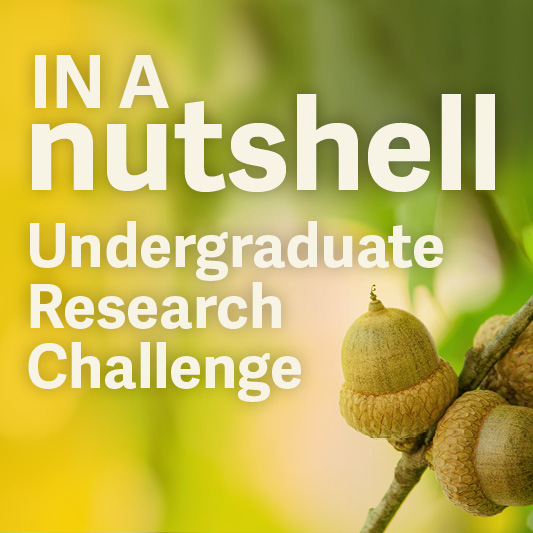In a Nutshell
Can you sum up your research in three minutes?
This is your time to find out!
As part of TRU’s annual Research Week, we're having our second annual head-to-head competition for undergraduate students.
Sign up and share the results of your research in three minutes — if you’re up for the challenge. Graduate students have been taking centre stage every year in the internationally renowned Three Minute Thesis (3MT) competition. Now it’s time for undergrads to claim the limelight with an identical goal: deliver a compelling presentation of research to a non-specialist audience using only a single static slide.
In a Nutshell is coordinated by TRU’s Undergraduate Research Ambassadors, with support from the Office of Research and Graduate Studies and TRU’s graduate mentors.
It's guaranteed fun, with great prizes up for grabs!
Can I participate?
All TRU undergraduate students who have been directly involved in research can take part.
- Must be enrolled in at least one course.
- Must be eligible to present in person on the day of the competition.
- Must agree to sign a media release form.
- Must have been directly involved in the research you are presenting.
Presentation rules
- A single static PowerPoint slide is permitted. Using a slide is optional, but recommended. Images used in the slide must be your own, or you must have permission from the owner of the photo(s) and provide proper credit.
- No additional electronic media is permitted (e.g. sound, video files).
- Unlike the 3MT, additional props are allowed (e.g. costumes, musical instruments, laboratory equipment).
- Presentations are limited to three minutes maximum.
- Presentations that go over three minutes will be disqualified.
- Unlike the 3MT, feel free to make your presentation a poem, rap or song.
- Presentations must be based on research you were directly involved in (this may include research done during research assistantships, UREAPs, honours, directed studies, etc.)
- Presentations MUST be based on research that has at least some results analysed.
- Presentations are to commence from the stage.
- Presentations are considered to have commenced when a presenter starts his/her presentation through movement or speech.
- Presenters must agree to be videotaped.
- The decision of the adjudicating panel is final.
What are the judges looking for?
Each of the three judging criteria has equal weight. Note that each criterion has an emphasis on the audience.
1. Communication style
- Was the thesis topic and its significance communicated in language appropriate to a non-specialist audience?
- Did the speaker use sufficient eye contact and vocal range, maintain a steady pace, and a confident stance?
- Did the speaker avoid scientific jargon, explain terminology, and provide adequate background information to illustrate points?
- Did the speaker spend the right amount of time on each element of their presentation — or did they elaborate for too long or were they rushed?
- Did the PowerPoint slide enhance, rather than detract, from their presentation — was it clear, legible, and concise?
2. Comprehension
- Did the presentation help the audience understand the research?
- Did the presenter clearly outline the nature and aims of the research?
- Was the significance of the presenter's research clearly outlined?
- Did the presentation follow a logical sequence?
3. Engagement
- Did the presentation make the audience want to know more?
- Was the presenter careful not to trivialize or 'dumb-down' the research?
- Did the presenter convey enthusiasm for their research?
- Did the presenter capture and maintain their audience's attention?
- Did the presentation make me want to know more about the speaker's research?

